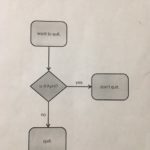Here’s a link to recent contributions for the Digital Media and Learning Hub site, DMLCentral.
Connecting Making, Designing and Composing
 In her closing keynote at FabLearn a couple years ago, Leah Buechley turned a critical eye on the maker movement. If you don’t know Buechley’s work, she is arguably one of the maker movement’s central players, founding the former High-Low Tech group at the MIT Media Lab and inventing the LilyPad Arduino, among many other contributions. She is a champion of making, which makes her all the more thoughtful in her critiques. Buechley asks us to consider who gets to make and who is represented in the maker movement…
In her closing keynote at FabLearn a couple years ago, Leah Buechley turned a critical eye on the maker movement. If you don’t know Buechley’s work, she is arguably one of the maker movement’s central players, founding the former High-Low Tech group at the MIT Media Lab and inventing the LilyPad Arduino, among many other contributions. She is a champion of making, which makes her all the more thoughtful in her critiques. Buechley asks us to consider who gets to make and who is represented in the maker movement…
 Like many of my friends and colleagues, August is the month for deep engagement in course design. If you were to shine a flashlight into this world, you would find me on a couch in the living room, hair disheveled, clothes unchanged for days, various plates and cups tossed to the floor, surrounded by books ranging from Vygotsky’s Mind in Society to Scieszka and Barnett’s Battle Bunny. I love this time of year. And, once I get started on design, it is almost impossible to stop. For me, imagining a learning environment, curating the texts, and…
Like many of my friends and colleagues, August is the month for deep engagement in course design. If you were to shine a flashlight into this world, you would find me on a couch in the living room, hair disheveled, clothes unchanged for days, various plates and cups tossed to the floor, surrounded by books ranging from Vygotsky’s Mind in Society to Scieszka and Barnett’s Battle Bunny. I love this time of year. And, once I get started on design, it is almost impossible to stop. For me, imagining a learning environment, curating the texts, and…
Connected Learning in Teacher Education: Come Make With Us
 A couple of years ago, I worked in the summer to build Connected Courses with some amazing colleagues. I dabbled in the work of connected learning prior to this invitation, but this was my first real attempt to put the principles into practice. Our goal with Connected Courses was, and remains, to support faculty who are “developing online, open courses that embody the principles of connected learning and the values of the open web.” At some point in the middle of our week of building, Mimi Ito made a comment, an aside, that stuck with me…
A couple of years ago, I worked in the summer to build Connected Courses with some amazing colleagues. I dabbled in the work of connected learning prior to this invitation, but this was my first real attempt to put the principles into practice. Our goal with Connected Courses was, and remains, to support faculty who are “developing online, open courses that embody the principles of connected learning and the values of the open web.” At some point in the middle of our week of building, Mimi Ito made a comment, an aside, that stuck with me…
Building Community With Peer Mentors with Keaton Kirkpatrick
 “The more I give my teacher-power to students and encourage them to take more responsibility for their own learning, the more they show me how to redesign my ways of teaching.” — Howard Rheingold, “Toward Peeragogy” Howard Rheingold has been a champion of peer-to-peer learning for years. Howard’s ideas are often in my head, milling about with Lev Vygotsky and social theories of learning. When I set out to design a large writing course for college freshmen, I was particularly focused on the role more capable peers would play in our writing class. In fact, I…
“The more I give my teacher-power to students and encourage them to take more responsibility for their own learning, the more they show me how to redesign my ways of teaching.” — Howard Rheingold, “Toward Peeragogy” Howard Rheingold has been a champion of peer-to-peer learning for years. Howard’s ideas are often in my head, milling about with Lev Vygotsky and social theories of learning. When I set out to design a large writing course for college freshmen, I was particularly focused on the role more capable peers would play in our writing class. In fact, I…
 Like many of my colleagues who think carefully about digital literacy and pedagogies, I began seriously considering the use of social media platforms in educational settings — sites like Twitter, Facebook, and Tumblr — around 2008. Despite nearly a decade of innovative uses of digital platforms in educational settings, the use of these platforms and spaces continues to be trivialized by the public and teachers alike, with cries echoing about attention spans and nostalgia for the loss of face-to-face interaction, which seem more “real.” But, to continue to dismiss digital platforms, particularly those focused on social…
Like many of my colleagues who think carefully about digital literacy and pedagogies, I began seriously considering the use of social media platforms in educational settings — sites like Twitter, Facebook, and Tumblr — around 2008. Despite nearly a decade of innovative uses of digital platforms in educational settings, the use of these platforms and spaces continues to be trivialized by the public and teachers alike, with cries echoing about attention spans and nostalgia for the loss of face-to-face interaction, which seem more “real.” But, to continue to dismiss digital platforms, particularly those focused on social…
Making Science: When Does Spaghetti Become a Light Ray? with Leslie Atkins Elliott
 For the past few years, we have been fortunate to work together in a scientific inquiry class. Bringing together science faculty and composition faculty makes for some lively conversations about the teaching of writing. The course is offered to future elementary school teachers who are typically non-science majors. We recently co-wrote with Irene Salter Composing Science: A Facilitator’s Guide to Writing in the Science Classroom (TCPress 2016), which describes our work with these future teachers and our practices for teaching writing in science. The book lays out how we engage students in practices that mirror the…
For the past few years, we have been fortunate to work together in a scientific inquiry class. Bringing together science faculty and composition faculty makes for some lively conversations about the teaching of writing. The course is offered to future elementary school teachers who are typically non-science majors. We recently co-wrote with Irene Salter Composing Science: A Facilitator’s Guide to Writing in the Science Classroom (TCPress 2016), which describes our work with these future teachers and our practices for teaching writing in science. The book lays out how we engage students in practices that mirror the…
 Last October, I gave an Ignite talk at the Digital Media and Learning Conference called “Epic Composition.” Below, I offer a more extended look at the design and structures of my “jumbo” first-year writing course at California State University, Chico. Walking into our “jumbo” first-year writing course as an outsider can be a bit intimidating. The room is packed with people: 90 students, nine writing mentors, and the instructor. Students sit in new desks: rolling chairs with a bottom “saucer” for storing backpacks, a moving tray designed for a laptop. Students have nicknamed the chairs…
Last October, I gave an Ignite talk at the Digital Media and Learning Conference called “Epic Composition.” Below, I offer a more extended look at the design and structures of my “jumbo” first-year writing course at California State University, Chico. Walking into our “jumbo” first-year writing course as an outsider can be a bit intimidating. The room is packed with people: 90 students, nine writing mentors, and the instructor. Students sit in new desks: rolling chairs with a bottom “saucer” for storing backpacks, a moving tray designed for a laptop. Students have nicknamed the chairs…


